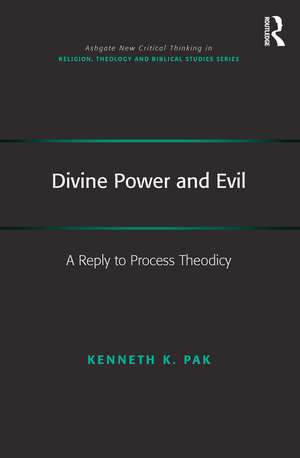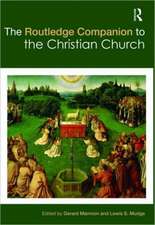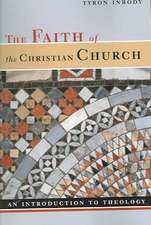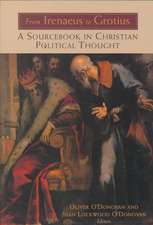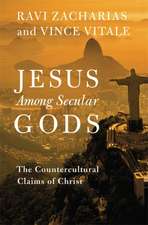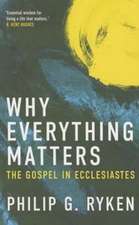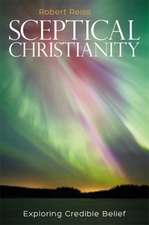Divine Power and Evil: A Reply to Process Theodicy: Routledge New Critical Thinking in Religion, Theology and Biblical Studies
Autor Kenneth K. Paken Limba Engleză Hardback – 4 apr 2016
| Toate formatele și edițiile | Preț | Express |
|---|---|---|
| Paperback (1) | 259.98 lei 6-8 săpt. | |
| Taylor & Francis – 30 iun 2020 | 259.98 lei 6-8 săpt. | |
| Hardback (1) | 821.10 lei 6-8 săpt. | |
| Taylor & Francis – 4 apr 2016 | 821.10 lei 6-8 săpt. |
Din seria Routledge New Critical Thinking in Religion, Theology and Biblical Studies
-
 Preț: 302.55 lei
Preț: 302.55 lei -
 Preț: 325.30 lei
Preț: 325.30 lei -
 Preț: 326.73 lei
Preț: 326.73 lei -
 Preț: 311.41 lei
Preț: 311.41 lei -
 Preț: 302.07 lei
Preț: 302.07 lei -
 Preț: 328.46 lei
Preț: 328.46 lei -
 Preț: 310.80 lei
Preț: 310.80 lei -
 Preț: 293.82 lei
Preț: 293.82 lei -
 Preț: 326.55 lei
Preț: 326.55 lei -
 Preț: 309.23 lei
Preț: 309.23 lei -
 Preț: 310.41 lei
Preț: 310.41 lei -
 Preț: 324.89 lei
Preț: 324.89 lei -
 Preț: 340.67 lei
Preț: 340.67 lei -
 Preț: 311.03 lei
Preț: 311.03 lei -
 Preț: 311.41 lei
Preț: 311.41 lei -
 Preț: 401.92 lei
Preț: 401.92 lei - 28%
 Preț: 820.71 lei
Preț: 820.71 lei - 26%
 Preț: 764.69 lei
Preț: 764.69 lei - 18%
 Preț: 1059.45 lei
Preț: 1059.45 lei - 18%
 Preț: 1054.71 lei
Preț: 1054.71 lei - 18%
 Preț: 1054.71 lei
Preț: 1054.71 lei - 28%
 Preț: 823.34 lei
Preț: 823.34 lei - 18%
 Preț: 1054.71 lei
Preț: 1054.71 lei - 18%
 Preț: 1058.79 lei
Preț: 1058.79 lei - 18%
 Preț: 1054.71 lei
Preț: 1054.71 lei - 18%
 Preț: 1057.09 lei
Preț: 1057.09 lei - 18%
 Preț: 1055.51 lei
Preț: 1055.51 lei - 20%
 Preț: 191.60 lei
Preț: 191.60 lei - 18%
 Preț: 1056.28 lei
Preț: 1056.28 lei - 18%
 Preț: 700.75 lei
Preț: 700.75 lei - 18%
 Preț: 1054.71 lei
Preț: 1054.71 lei - 31%
 Preț: 767.07 lei
Preț: 767.07 lei - 26%
 Preț: 877.59 lei
Preț: 877.59 lei - 18%
 Preț: 1054.71 lei
Preț: 1054.71 lei - 18%
 Preț: 1057.89 lei
Preț: 1057.89 lei - 31%
 Preț: 765.40 lei
Preț: 765.40 lei - 18%
 Preț: 1054.71 lei
Preț: 1054.71 lei - 18%
 Preț: 1000.27 lei
Preț: 1000.27 lei - 30%
 Preț: 850.17 lei
Preț: 850.17 lei - 18%
 Preț: 1060.25 lei
Preț: 1060.25 lei - 18%
 Preț: 1059.45 lei
Preț: 1059.45 lei - 18%
 Preț: 1059.45 lei
Preț: 1059.45 lei - 18%
 Preț: 1000.27 lei
Preț: 1000.27 lei - 18%
 Preț: 1000.27 lei
Preț: 1000.27 lei - 18%
 Preț: 1054.71 lei
Preț: 1054.71 lei - 18%
 Preț: 1108.37 lei
Preț: 1108.37 lei - 26%
 Preț: 821.13 lei
Preț: 821.13 lei - 26%
 Preț: 820.32 lei
Preț: 820.32 lei - 18%
 Preț: 1054.71 lei
Preț: 1054.71 lei - 18%
 Preț: 1053.79 lei
Preț: 1053.79 lei
Preț: 821.10 lei
Preț vechi: 1103.50 lei
-26% Nou
Puncte Express: 1232
Preț estimativ în valută:
157.14€ • 163.45$ • 129.73£
157.14€ • 163.45$ • 129.73£
Carte tipărită la comandă
Livrare economică 14-28 aprilie
Preluare comenzi: 021 569.72.76
Specificații
ISBN-13: 9781472463050
ISBN-10: 1472463056
Pagini: 192
Dimensiuni: 156 x 234 mm
Greutate: 0.52 kg
Ediția:1
Editura: Taylor & Francis
Colecția Routledge
Seria Routledge New Critical Thinking in Religion, Theology and Biblical Studies
Locul publicării:Oxford, United Kingdom
ISBN-10: 1472463056
Pagini: 192
Dimensiuni: 156 x 234 mm
Greutate: 0.52 kg
Ediția:1
Editura: Taylor & Francis
Colecția Routledge
Seria Routledge New Critical Thinking in Religion, Theology and Biblical Studies
Locul publicării:Oxford, United Kingdom
Cuprins
Introduction 1. God’s Persuasive Power of and the Correlations of Value and Power in Process Theism 2. The Process God’s Divine Aim and the Risk of Evil 3. Delimiting the Traditional Notion of Divine Omnipotence 4. Metaphysical Hypotheses and Divine Omnipotence 5. Meaning, Hope and Worshipfulness of the Process God 6. Monistic Power of God in Traditional Theism 7. Incompatibility of Freedom in Free-Will Theism 8. Why God Does Not Prevent All Evil 9. Genuine Evil and Task of the Philosophical Theologian 10. Conclusion: Toward a More Adequate Theodicy
Notă biografică
Kenneth K. Pak (Ph.D., KU Leuven) is Assistant Professor of Philosophy at Gulf University for Science & Technology, Kuwait. His primary area of teaching and research is philosophy of religion, especially the problem of evil.
Recenzii
"Process theists invariably claim that their response to the problem of evil is far superior to that of traditional theism. In his careful examination of the influential writings of David Griffin, Kenneth K. Pak reveals a number of flaws in Griffin's arguments concerning evil. He also identifies resources for a response from traditional free will theism, some of them derived from Griffin's own work. Divine Power and Evil is an important contribution to the literature on this vital topic." - William Hasker, Huntington University, USA
Descriere
Divine Power and Evil responds to Griffin's criticisms against traditional theodicy, assesses the merits of process theodicy, and points out ways in which traditional theism could incorporate a number of Griffin's valuable insights in progressing toward a philosophically and theologically satisfactory theodicy. It provides a new and important contribution to a long-standing debate within philosophy of religion and theology.
